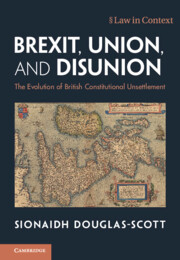Book contents
- Brexit, Union, and Disunion
- Law in Context
- Brexit, Union, and Disunion
- Copyright page
- Contents
- Figures
- Introduction
- Part I Five Case Studies of Acts of Union and Disunion
- Part II Five Themes
- 6 Sovereignty
- 7 Unions and Disunions
- 8 Federalism, Devolution, and Differentiation
- 9 Democracy and Referendums
- 10 Human Rights
- Conclusion
- Index
Conclusion
from Part II - Five Themes
Published online by Cambridge University Press: 26 October 2023
- Brexit, Union, and Disunion
- Law in Context
- Brexit, Union, and Disunion
- Copyright page
- Contents
- Figures
- Introduction
- Part I Five Case Studies of Acts of Union and Disunion
- Part II Five Themes
- 6 Sovereignty
- 7 Unions and Disunions
- 8 Federalism, Devolution, and Differentiation
- 9 Democracy and Referendums
- 10 Human Rights
- Conclusion
- Index
Summary
This book provides a critical analysis of Brexit, placing it in the broader context of the historical development of the British Constitution and earlier disputes as to the meaning of statehood, sovereignty, and territorial boundaries. Some of the greatest challenges posed by the UK’s withdrawal from the EU are those it places on the British Constitution, which is already ‘unsettled’ and under strain. This book investigates this impact, but also uniquely locates Brexit in the broader context of historically significant British ‘acts of union or disunion’ – such as the loss of former US colonies and British Empire, and the place of Scotland and Ireland in the Union. These precedents help us understand how a British constitutional identity has been shaped or dismantled by legal concepts of union or sovereignty.
- Type
- Chapter
- Information
- Brexit, Union, and DisunionThe Evolution of British Constitutional Unsettlement, pp. 496 - 500Publisher: Cambridge University PressPrint publication year: 2023

